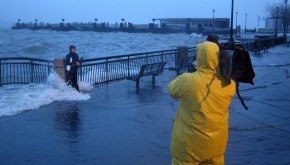Climate science serves as typically the cornerstone for informed decision-making in the face of global environmental challenges. In this article, we delve into the critical role of issues science in shaping world policies, guiding policymakers, together with fostering collaborative efforts to deal with the complex issues associated with climate change.
1 . Logical Foundations of Climate Suggestions:
Climate science provides the empirical foundation upon which climate guidelines are built. Robust scientific exams, including reports from the Intergovernmental Panel on Climate Modify (IPCC), offer comprehensive skills into the current state with the climate, projections for the future, and also the potential impacts of various insurance plan options. Policymakers rely on this unique scientific foundation to come up with evidence-based strategies for mitigating along with adapting to climate modify.
2 . Global Agreements plus Treaties:
Key international legal agreements, such as the Paris Agreement, are usually informed by the scientific general opinion on climate change. Typically the Paris Agreement, adopted for 2015, reflects a global determination to limit global heat increases and enhance adaptable capacities. The scientific local community played a pivotal part in shaping the agreement’s targets, ensuring they straighten with the scientific imperative of limiting global warming to very well below 2 degrees Celsius.
3. Carbon Budgeting along with Emission Reduction Targets:
Weather science underpins the concept of as well as budgets, which quantifies the volume of greenhouse gases that can be spewed while limiting global climate rise. Emission reduction focuses on set by countries will be intricately linked to these prices, reflecting a balance between the need for fiscal development and the imperative for you to curb emissions. Climate science guides the setting about realistic and effective expectations to achieve broader environmental aims.
4. Vulnerability Assessments in addition to Adaptation Strategies:
Scientific exams of vulnerability to issues change help identify areas and communities at improved risk. These assessments guideline policymakers in developing difference strategies to enhance resilience. Out of infrastructure planning to agricultural tactics, adaptation measures are designed while using best available scientific understanding to address specific challenges involving changing climate conditions.
5. First Warning Systems and Problems Preparedness:
Advancements in weather science contribute to the development of earlier warning systems for intense weather events. Timely as well as accurate predictions, informed by climate data and modeling, enable communities to prepare meant for and respond to disasters safely and effectively. The integration of climate scientific disciplines into disaster management strategies enhances resilience and lessens the impact of climate-related gatherings.
6. Climate Finance Allot; deliver; hand out; disseminate; ration; apportion; assign; dispense and Investment Decisions:
Health systems and international organizations budget climate finance based on testing of where funding is most urgently needed. Climate science aids identify regions susceptible to the adverse effects of climate alter and informs decisions for allocating financial resources for edition and mitigation projects. Investors also rely on climate technology to assess climate-related risks plus opportunities.
7. Assessing Has an effect on on Biodiversity and Ecosystems:
Climate science is crucial with regard to evaluating the impacts about climate change on biodiversity and ecosystems. Policymakers work with this information to design conservation procedures, protect endangered species, and even preserve critical habitats. Integrating climate science into biodiversity policies ensures a comprehensive approach to safeguarding the planet’s vibrant biological diversity.
8. Following Progress and Accountability:
Medical monitoring and assessment enjoy a pivotal role in tracking the progress for climate policies and controlling nations accountable for right here their dedication. Metrics derived from climate knowledge, such as greenhouse gas ranges and temperature trends, be benchmarks for evaluating the potency of policies and identifying parts that require adjustments.
9. Intercontinental Collaboration and Knowledge Revealing:
The global nature of local climate change necessitates international a joint venture, and climate science serves as a common language for countries to share knowledge and conclusions. Collaborative research initiatives, data-sharing agreements, and joint research assessments foster a organization understanding of the challenges posed by climate change and market collaborative solutions.
10. Public Awareness and Advocacy:
Local climate science is instrumental throughout raising public awareness together with fostering advocacy for efficient climate policies. Scientific conclusions are communicated to the public through various channels, strengthening individuals to engage in informed discussions, demand action from policymakers, and make sustainable choices of their daily lives.
Conclusion:
Environment science stands as an obbligato tool for shaping the worldwide response to climate change. Their integration into policy-making operations ensures that decisions are grounded in empirical evidence in addition to guided by a comprehensive knowledge of the complex interactions inside of Earth’s climate system. Given that the world collectively addresses the very challenges posed by climate transform, the continued collaboration involving the scientific community and policymakers remains essential for building a sustainable and resilient future for our planet.





